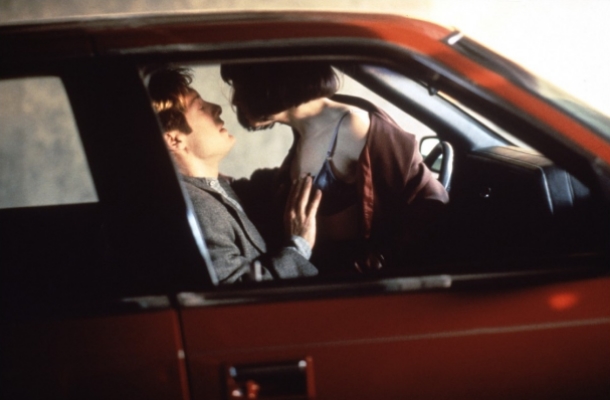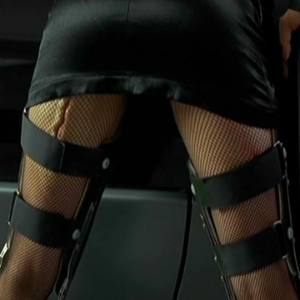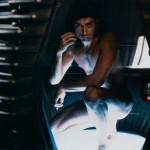
TIFF’s From Within - The Films of David Cronenberg Review: Crash (1996) - NP Approved

Cast: James Spader, Holly Hunter, Elias Koteas
Director: David Cronenberg
Country: Drama
Genre: Canada | UK
Official Trailer: Here
Editor’s Notes: The following review is part of our coverage for TIFF’s From Within: The Films of David Cronenberg which runs from November 1st to January 19th at TIFF Bell Lightbox. For more information on upcoming TIFF film series visit http://tiff.net and follow TIFF on Twitter at @TIFF_NET.
David Cronenberg’s Crash immerses us in a world where dispassionate lovers seek new thrills to bring something tangibly gratifying into their unfulfilled existence. Based on the 1973 novel by J.G. Ballard, Cronenberg’s film brazenly collides the western world’s secret fixations while exploring his own preoccupations with the corruption and enhancements of the human body through technological accoutrements, cold contrivances that ultimately rob us of that which makes us human. The dystopian vision of Toronto in which Crash takes place is a concrete wasteland of bustling traffic, and automobiles extend into infinity in every perceivable direction, hiding the face of humanity in steel behemoths that act as secret sanctuaries to the apathetic passengers of life’s freeways.
Cronenberg’s characters in Crash have been long detached from the simple pleasures of life as even promiscuous sex outside of marriage isn’t enough to satiate the unquenchable desires of Catherine and James Ballard. They relate stories of their promiscuity with cold detachment, finding no gratification in empty lustful rendezvous and waning arousal from the steamy exchanges that were once an object of provocation and stimulation for this bored and over-privileged couple. It isn’t until he is faced with his own mortality that James finds something tangible and arousing, finding himself suddenly capable of revealing the hidden primality behind his customarily emotionless and calculated exterior. He fears these feelings as they rob him of control but finds these new feelings of helplessness overwhelmingly seductive.
Cronenberg titillates us with what may seem like an illogical source of sexuality as he grants seductive qualities to the mechanical.
James is hopelessly compelled to explore these unfamiliar sources of arousal, and a near miss while driving the other survivor of his initial accident, Dr. Helen Remington (played with effortless, dispassionate sexuality by Holly Hunter), reignites these feelings and they drive to a parking garage (the automobile’s filthy concrete boudoir) to release their explosive outburst of sexual energy. James becomes drawn into Helen’s secret world and finds himself in the strange subculture of crash enthusiasts, getting off on unspeakable reckless thrills while the rest of the unknowing world sleeps. The scarred group of psycho-sexual thrill seekers reenact famous automobile accidents, deriving sexual excitement from dangerous taboos while secretly wishing for the final thrill that only death can offer. They gather to watch grainy tapes of automotive crash tests so often that the “regulars” know the idiosyncrasies of the VCR being used to watch them, bored by the safety of their unusual voyeurism as they watch the tapes and disinterestedly fondle one another in anticipation of the night, when they can finally push themselves beyond their physical limits and lose themselves in the intoxicating seduction of carnage and death.
 Catherine Ballard is intrigued and aroused by the illicit possibilities of this new fixation, but doesn’t immediately understand the dangerous and permanent consequences that these new thrills would bring. Her first excursion into this dark world leaves her bruised and battered, confused by the disparate emotions that clash within her as she gets firsthand experience with the brutality of this taboo titillation. Even undesirable and sinister emotions are preferable to incurable apathy, and Catherine enters this world with trepidatious fatalism, dreading and secretly anticipating a deadly outcome that would offer one last moment of unadulterated exhilaration.
Catherine Ballard is intrigued and aroused by the illicit possibilities of this new fixation, but doesn’t immediately understand the dangerous and permanent consequences that these new thrills would bring. Her first excursion into this dark world leaves her bruised and battered, confused by the disparate emotions that clash within her as she gets firsthand experience with the brutality of this taboo titillation. Even undesirable and sinister emotions are preferable to incurable apathy, and Catherine enters this world with trepidatious fatalism, dreading and secretly anticipating a deadly outcome that would offer one last moment of unadulterated exhilaration.
Cronenberg titillates us with what may seem like an illogical source of sexuality as he grants seductive qualities to the mechanical, but the culture of the twentieth century was forever altered by the ubiquity of the automobile and it is only logical that our mechanisms of sexuality should respond in kind. The automobile acts as our own private steel sanctuary and an extension of our physical bodies as we spend hours a day using it as a method of conveyance through a sprawling ocean of concrete and as an ineffectual form of expression as we remain hopelessly isolated, surrounded by a sea of passengers traveling down the drab blacktop byways of life’s uneventful roads. To disrupt the placidity of the apathetic commuters and resigned migrants of modern existence, one must dislodge them from the comfort of their private sanctuary with the unexpected orgasmic violence of colliding steel and exploding glass. If they are lucky enough to live through it they may find the banal pleasures of daily life ungratifying and meaningless.
Related Posts
![]()
Matthew Blevins
![]()
Latest posts by Matthew Blevins (see all)





























